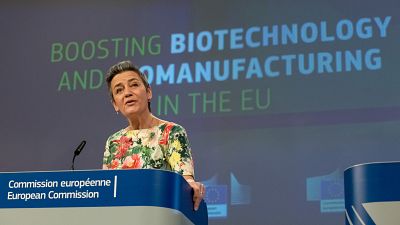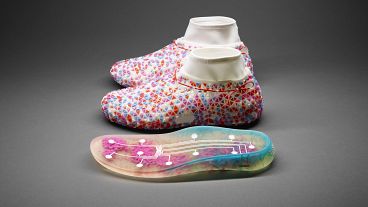The EU executive is drafting a strategy designating biotech critical to the continent’s strategic autonomy, a leaked document seen by Euronews shows.
Biotech is set to be designated as “one of the critical technologies for the EU’s economic security”, according to a preparatory outline of an EU communication set to be published next month, seen by Euronews.
Several of the EU executive's departments including directorates-general for competition, health, industry, research and innovation, and crisis preparedness are contributing to the communication on the ‘EU Biotech and Biomanufacturing Initiative’, due to be unveiled by the commission on 20 March, according to its executive agenda.
The main objectives of the initiative are to strengthen research and development, facilitate marketing of biotech products and solutions, and reinforce the bloc’s economic security.
Biopharma innovation takes centre stage in the Commission’s biotech plan with a focus on treatments using CAR-T cells that are genetically engineered to target a specific antigen on cancer cells and genome editing technology CRISPR-Cas9, awarded the Nobel Prize in 2020.
Technologies based on messenger RNA (mRNA) molecules, which played an essential role in COVID-19 vaccines, are also mentioned in the draft among the innovative biopharma breakthroughs that the EU should support.
The draft document stresses the need to regain “European leadership for health biotech” focusing on "public health benefits, new treatments, more tailored treatments” and “fostering an enabling environment for clinical trials”.
The EU executive counts on the latest policy developments such as the revised framework on substances of human origins (SoHO) and the improved access to genomic data through the yet-to-be-approved European Health Data Space (EHDS) to ensure the EU’s leadership in the sector of biomedicines.
‘Industrial’ open questions
The commission looks to “development of an entrepreneurial environment” to provide an industrial stimulus to the sector, pointing to the importance of “vertical integration of primary producers” within inclusive value chains.
Other open questions in the document relate to how the industry could maintain a skilled workforce and protect its biotech know-how, but also how to stimulate market demand for sustainable and circular bio-based products.
Industrial issues have thus far been neglected in previous biotech initiatives by the bloc, which focused more on research and development. But for Claire Skentelbery, director general of the EU biotech association EuropaBio, this initiative must translate into tangible commitments with the next commission.
“It has to deliver substantial and fast industrial progress for the EU and be bold on key bottlenecks that prevent Europe from being a leading global player,” she told Euronews.
Europe needs to make some strategic decisions about what it wants to manufacture in the continent and how it influences global trade since other global regions have set specific targets for biomanufacturing, Skentelbery said.
“Europe needs to have skin in the game of global supply chains – and you don’t achieve that by only being a consumer of products from elsewhere, especially within vital supply chains such as food and medicines,” she added.
Financials and red tape
European biotech's difficulties in attracting capital are also touched on in the document with the EU executive explicitly mentioning the need to support “consolidation of investment funds, including venture capital, stock exchanges and post-trading infrastructure”.
The draft also touts introducing an "R&I tax credit”, which would be novel and controversial given tax matters remain firmly in the hands of member states.
The financial role of the European Investment Bank (EIB), the European Investment Fund (EIF) and the national promotional banks to support production capacity is highlighted in the part dealing with improving availability of financing.
The Commission seems also keen to lend a helping hand to “manufacturers of innovative biotechnologies in navigating the complex regulatory landscape in the EU and in bringing new biotech products to the market”.
One option touted by the draft is for a one-stop shop to permit and authorise biotech manufacturing.
In general, the EU regulators will increase support for biotech industries by providing “harmonisation of definitions, elaboration and updating of standards and sustainability criteria”, offering a segue to the bloc’s taxonomy legislation, according to the draft document.
The document calls on the EU to identify, support, and invest “in promising areas, projects and companies also through the EIC [European Innovation Council] and EIC Fund.”
The “alignment of research priorities and agendas for greater impact” is another area on which the commission’s services are working "through reinforcing collaboration and synergies, promoting multi-country projects."



